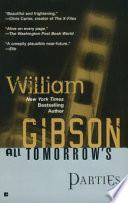
“They sat around accessing media all day and talking about it, and nothing ever seemed to get done.”
Source: All Tomorrow's Parties (2003), Ch. 7 : Sharehouse, p. 33

All Tomorrow's Parties is a science fiction novel by American-Canadian writer William Gibson, the third and final book in his Bridge trilogy. Like its predecessors, All Tomorrow's Parties is a speculative fiction novel set in a postmodern, dystopian, postcyberpunk future. The novel borrows its title from a song by Velvet Underground. It is written in the third person and deals with Gibsonian themes of emergent technology. The novel was initially published by Viking Press on October 7, 1999.
“They sat around accessing media all day and talking about it, and nothing ever seemed to get done.”
Source: All Tomorrow's Parties (2003), Ch. 7 : Sharehouse, p. 33
“Everything to Fontaine, had a story.”
Source: All Tomorrow's Parties (2003), Ch. 38 : Vincent Black Lightning, p. 191
Context: If Skinner couldn't tell Fontaine a story about something, Fontaine would make up his own story, read function in the shape of something, read use in the way it was worn down. It seemed to comfort him.
Everything to Fontaine, had a story. Each object, each fragment comprising the built world. A chorus of voices, the past alive in everything, that sea upon which the present tossed and rode. When he'd built Skinner's funicular, the elevator that crawled like a small cable car up the angled iron of the tower, when they old man's hip had gotten too bad to allow him to easily climb, Fontaine had a story about the derivation of each piece. He wove their stories together, applied electricity: the thing rose, clicking, to the hatch in the floor of Skinner's room.
“A chorus of voices, the past alive in everything, that sea upon which the present tossed and rode.”
Source: All Tomorrow's Parties (2003), Ch. 38 : Vincent Black Lightning, p. 191
Context: If Skinner couldn't tell Fontaine a story about something, Fontaine would make up his own story, read function in the shape of something, read use in the way it was worn down. It seemed to comfort him.
Everything to Fontaine, had a story. Each object, each fragment comprising the built world. A chorus of voices, the past alive in everything, that sea upon which the present tossed and rode. When he'd built Skinner's funicular, the elevator that crawled like a small cable car up the angled iron of the tower, when they old man's hip had gotten too bad to allow him to easily climb, Fontaine had a story about the derivation of each piece. He wove their stories together, applied electricity: the thing rose, clicking, to the hatch in the floor of Skinner's room.